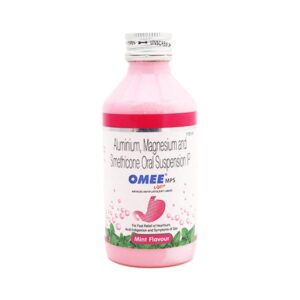MAGNESIUM + SIMETHICONE + ALUMINIUM
Magnesium: Magnesium is a mineral that is essential for various bodily functions. It is used as a medication in the form of magnesium salts, such as magnesium sulfate or magnesium citrate, to address magnesium deficiencies and as a supplement to treat certain medical conditions.
The mechanism of action of magnesium involves its role in many enzymatic reactions within the body. It is involved in the regulation of nerve and muscle function, blood pressure, and protein synthesis. Magnesium also plays a crucial role in maintaining a steady heart rhythm and promoting bone health.
The dose of magnesium varies depending on the specific condition being treated. For example, in the case of magnesium deficiencies, the recommended daily intake for adults is around 400-420 mg for males and 310-320 mg for females. However, the dosage may be higher for individuals with certain underlying health conditions or during pregnancy.
Although magnesium supplements are generally safe when taken as directed, they can sometimes cause side effects. Common side effects include diarrhea, nausea, and abdominal cramping. In rare cases, magnesium can cause more severe side effects such as irregular heartbeat, low blood pressure, or allergic reactions. It is important to consult a healthcare professional before starting magnesium supplements to determine the appropriate dosage and discuss any potential risks or interactions with other medications.
Simethicone: Simethicone is a drug used to relieve symptoms of excess gas in the digestive tract, such as bloating, belching, and discomfort. It is an over-the-counter medication and is available in various forms such as chewable tablets, capsules, and liquids.
The mechanism of action of simethicone is not fully understood, but it is believed to work by reducing the surface tension of gas bubbles, allowing them to combine and be expelled more easily. This helps to alleviate symptoms of gas and provide relief.
The typical dose of simethicone for adults and children over 12 years old is 40-125 mg taken orally, usually after meals and at bedtime, or as directed by a healthcare professional. The dose for younger children should be determined by a doctor based on age and weight.
Simethicone is generally well-tolerated and has minimal side effects. Common side effects, if any, may include mild stomach upset or diarrhea. These side effects are usually rare and temporary. It is important to follow the recommended dosage and consult a doctor if you experience any severe or persistent side effects.
Simethicone is generally considered safe for use during pregnancy and breastfeeding, but it is always advisable to consult with a healthcare professional before taking any medication.
In summary, simethicone is an over-the-counter drug used to alleviate symptoms of excess gas in the digestive tract. It reduces the surface tension of gas bubbles, allowing them to be expelled more easily. The usual recommended dose for adults and children over 12 is 40-125 mg. Side effects are typically mild and rare, and it is generally safe for use during pregnancy and breastfeeding, with proper medical guidance.
Aluminium: Drug: Aluminium
Use: Aluminium is commonly used as an over-the-counter antacid medication. It helps to neutralize stomach acid and relieve symptoms of indigestion, heartburn, and upset stomach. It can also be used as a phosphate binder in patients with kidney disease.
Mechanism of Action: Aluminium works by binding to excess stomach acid in the form of aluminum hydroxide. This reaction leads to the formation of water and aluminum salts which reduce the acidity in the stomach.
Dose: The recommended dose of aluminium as an antacid is 10-20 mL (320-640 mg) 1-3 times a day, taken between meals and at bedtime or as directed by a healthcare professional. For phosphate binding in patients with kidney disease, the dose is usually individualized based on the patient’s needs and response to therapy.
Side Effects: Common side effects of aluminium include constipation, stomach cramps, loss of appetite, and diarrhea. Extended or excessive use of aluminium as an antacid may lead to the development of kidney stones or electrolyte imbalances. In rare cases, prolonged use of aluminium may contribute to a condition known as aluminum-induced osteomalacia, where there is a decrease in bone mineral density. It is important to consult a healthcare professional if side effects persist or worsen, or if any new symptoms appear.

